
Ultimate Guide to Comment Moderation in WordPress
[ad_1]
WordPress communication is key to forming lasting, meaningful relationships with your site visitors. It is the first step to converting a random visitor into a paying customer. It is also a form of delivering value to a visitor.
The Reciprocity Rule
When you deliver value to someone—be it a nonpaying consumer or a paying customer—you silently (and sometimes unknowingly) engage them according to what psychologists refer to as the reciprocity rule. This rule is something that’s embedded in our DNA. It has evolved over thousands of years and has played a significant role in the formation of society as we know it.
Let’s explain the rule through an example.
Imagine this: You’re new to work, and a colleague hands you a Diet Coke. You may or may not have invited such action. If your colleague does this out of the blue, you’re bound to do something in return for him in the near future—the sooner, the better. You would invariably end up bringing him a coffee or something of equal or higher value even if your colleague didn’t ask for it! Once you do so, you’d feel that the two of you are on equal terms. You’d feel as if a weight had been lifted off your chest.

Reciprocity seeks balance.
This invisible force of indebtedness is generated due to the basic give-and-take nature of the human cognitive behavior. This is the reciprocity rule.
Leveraging Reciprocity in the Digital Space
Why are we talking about the reciprocity rule in a comment moderation guide, you ask? Well, dear reader, it is because this rule applies to the digital space as well. You can leverage the unbeatable power of this rule to develop lasting customer relationships. In the long run, customers ultimately turn into product evangelists, giving you priceless word-of-mouth marketing.
Case Study: Colorlib

Consider this example. Colorlib develops WordPress themes and runs a blog containing useful WordPress tips, tutorials, resources, etc. Curating original, high-quality content is no easy task, and it is surely not inexpensive. However, Colorlib invests resources in terms of money, time, and effort to create and maintain the quality of its blog content. What do they gain in return?
Customer loyalty
This is where the reciprocity rule comes in. The readers derive value from Colorlib’s blog. Subconsciously, this is similar to your new work colleague handing you a can of Diet Coke.

When the blog’s reader actually wants to buy a WordPress theme, he or she will think of Colorlib first. This is what marketers like to call a top-of-the-mind presence. The first name that comes to your mind when you need (or want) a particular item is clearly the winner. So, if you are a regular subscriber to the Colorlib blog, chances are the reciprocity rule has already been deeply rooted in your mind—all without you even knowing it existed!
Here’s another crucial point that personally resonates with me, and I applaud Aigars for this. Being a theme company, Colorlib is dedicated to creating high-quality WordPress theme lists. Traditional marketers would call this suicide! You are listing your competitors’ products on your own business website? Have you lost it, man? Here lies the subtle difference. Not all design tastes are alike. It is quite possible that a visitor might like a WordPress theme from a different company. Aigars is determined to deliver true value to his blog’s visitors. This builds enormous community respect and customer loyalty.
Communication Is Key

Now that you are familiar with one of the fundamental factors of developing lasting customer relationships, it’s time for us to talk about customer communication.
Listening to your customer is a quintessential marketing task.
In the online community, communication is highly diversified and takes place in multiple media. Examples are Facebook likes, comments, tweets, direct emails, chats, forums, and support tickets (helpdesk software).
In the realm of blogging, comments are the primary means of communication. However, getting people to comment on your blog is not an easy task. It requires interesting content that strikes a chord with the reader’s curiosity and makes him reflect. Once the reader forms an opinion, he or she will most likely voice it.
As a comment moderator, your job starts here.

First of all, you need to realize that the key to building lasting customer relationships is good communication. Comments can take various forms. They can be appreciative, inquisitive, negative, or derogatory/abusive. (Note: If the comments are derogatory and abusive, you should delete them.)
No matter the case, though, you need to respond to each comment with due respect. Even a one-word comment—like “Thanks!”—deserves a reply. Your reader has taken the time out of his/her schedule to appreciate your work. As a good marketer, it is your job to acknowledge it. Something simple will go a long way: “Thanks for stopping by, {name}; glad you liked the article.” You may add, “Let me know if you need any help with the tutorial.”
The WordPress default comment system is a marvel with its own set of features (we’ll get to that in a moment). However, if you want to make it even easier for the user to leave a comment, you might want to use the following free WordPress plugins.

The Jetpack Comments module
One of the most popular plugins in WordPress, Jetpack houses many features (modules) under one plugin. Some of them include free CDN, infinite post scrolling, image galleries, and site stats.
Of course, that’s not what we’re here for (although you’re welcome to try them). We’re interested in the Jetpack Comments module. Once activated, the default comment form in WordPress gets replaced with Jetpack’s comment form.
Here are its unique features:
- Social login capabilities — Visitors can now leave comments using their social profiles, including Facebook, Twitter, Google+, and WordPress.
- Email notifications — Commenters can choose to be notified of new comments and/or new posts via email.
By subscribing to new posts, the Jetpack Comments module functions like a lead generator (i.e., it captures emails). When a commenter wants to be notified of new comments, this tells you that (a) the conversation is going well and (b) you’ve crafted compelling content. Kudos!
WordPress comment plugins are a dime a dozen. Therefore, I’m just going to list them here. Choose wisely.
This plugin goes easy on the features but gets the job done. It simply adds the Facebook comment form in the default WordPress comment area. You can also embed a Facebook comment form in any post/page via the comment form.
Facebook for WordPress
The official Facebook plugin brings a ton of features at your disposal. Other than integrating Facebook comments, the plugin enables you to include the open graph protocol to optimize content for sharing on Facebook and other social media.
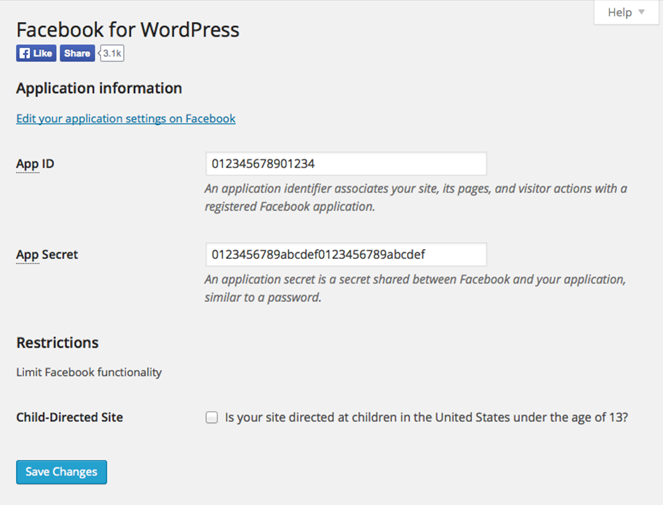
Plugin’s settings
You can also derive meaningful analytics using Facebook Insights, generate more traffic through the Recommendations Box, and many more.
Remember how Jetpack allows your commenters to subscribe to a post for subsequent comments on the discussion? This plugin also allows you to do the same, only with an added feature of a double opt-in. Double opt-ins are very useful in engaging subscriber commitment, which is another brilliant marketer’s tool.

Plugin’s settings
CommentLuv has made it to more “must have plugins list” than any other plugin. Back in the day when I started using WordPress, I saw this plugin on everyone’s blog. After each comment, there was a small link to the author’s latest post, which gave a commenter free exposure for his blog.
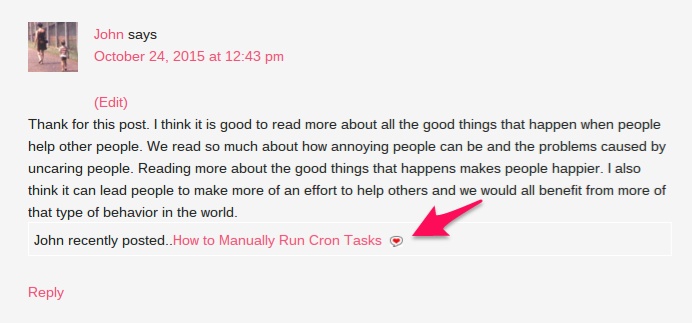
CommentLuv plugin in action
Other than being a great comment plugin, which incorporates social media, CommentLuv (and its premium version, “CommentLuv Pro”) is a full-blown traffic and lead generation machine.
Postmatic
Postmatic is another awesome WordPress comment plugin that falls under the “lead generation” category. Like its competitors (Jetpack Comments module, Subscribe to Comments Reloaded), Postmatic lets your commenters subscribe to a post’s comments.
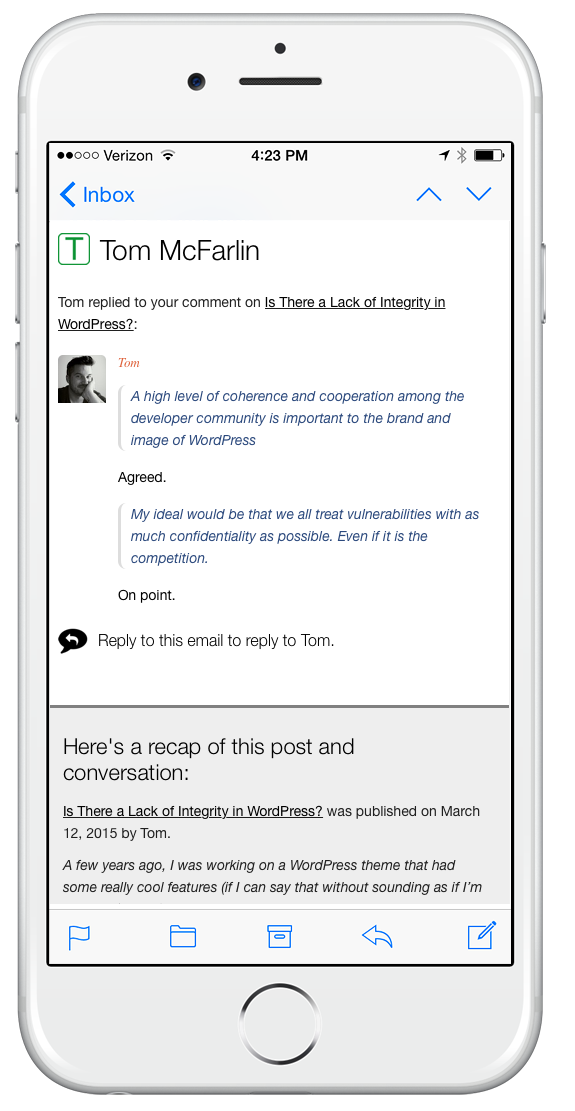
Directly reply to comments from your inbox.
However, the plugin’s USP (unique selling point) lies in the fact that it lets your visitors leave follow-up comments directly via email. As a user, if I am engaged in an interesting discussion, it would be super helpful if I could directly leave a comment via my email app. Not to mention, it’s simple and streamlined and works on poor data connections!
Popular Widget
This is a rather simple yet brilliantly effective WordPress comment plugin. It creates a widget that lists the most popular posts on your blog, which is measured either by the number of views or comments. The time period can be customized, the default being one year.
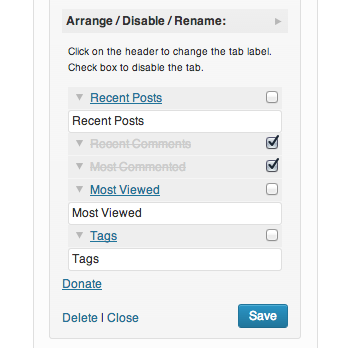
Widget customization options—you can toggle metrics.
If you’re running an e-commerce store using WooCommerce, this plugin might come in handy. It lets your visitors discuss, vote, and share your store’s products! WooDiscuz also integrates with several popular membership options, such as BuddyPress, Ultimate Member, and Users Ultra.
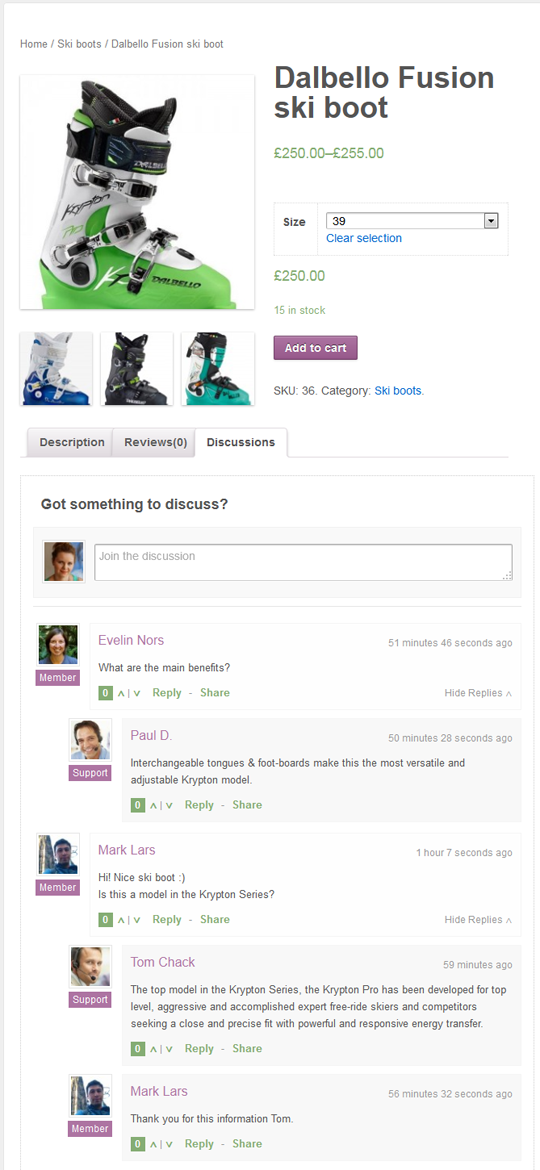
A typical WooCommerce store powered by WooDiscuz
Yoast is no stranger to the WordPress ecosystem. Its premier plugin, WordPress SEO, is the de facto SEO plugin for WordPress. It also has this awesome comment plugin that gives you certain “power tweaks” to your comment system.
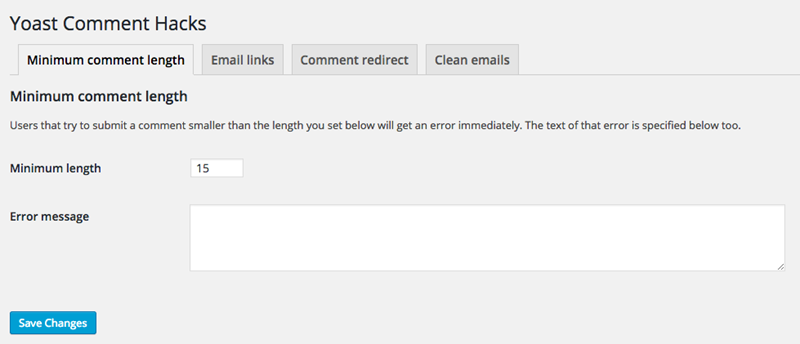
The plugin’s settings
Options available include cleaner comment notification emails, the ability to disallow comments beyond a certain length (a small but highly useful feature), and settings to redirect first-time commenters to a special thank you page.
Formerly known as Google+ Comments for WordPress, this plugin adds multiple tabs in your WordPress comment form. Each tab is dedicated to a social network.
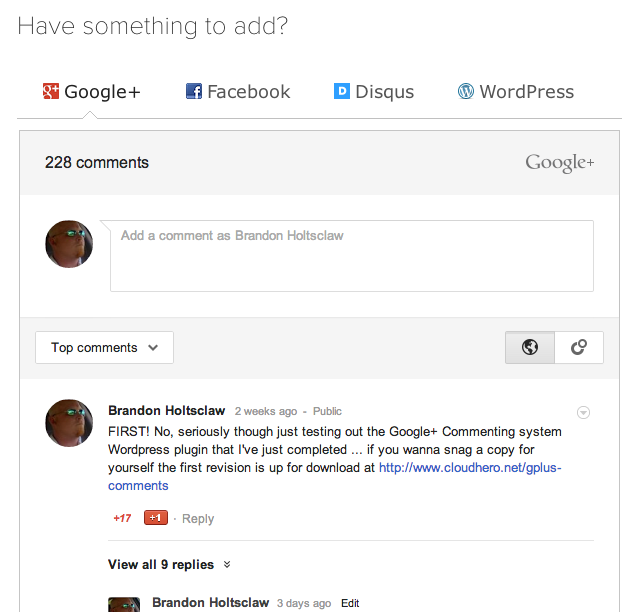
The plugin in action
In the above screenshot, you can see four tabs for Google+, Facebook, WordPress, and Disqus. Pretty neat, right?
On a side note, you cannot turn off a social network, which is probably a feature the developer could include.

The Disqus commenting system
If you want to avoid the hassle of styling comment forms, figuring out which social networks to offer, and comparing the pros and cons of each comment plugins, I’m with you. Allow me to introduce you to the two best third-party commenting solutions for WordPress: Disqus and Livefyre.
These are cloud-based solutions, and they play nice with WordPress. That means the comments are always saved (and synchronized) in your WordPress database. As a result, when you deactivate or delete the plugin, the comments are retained.
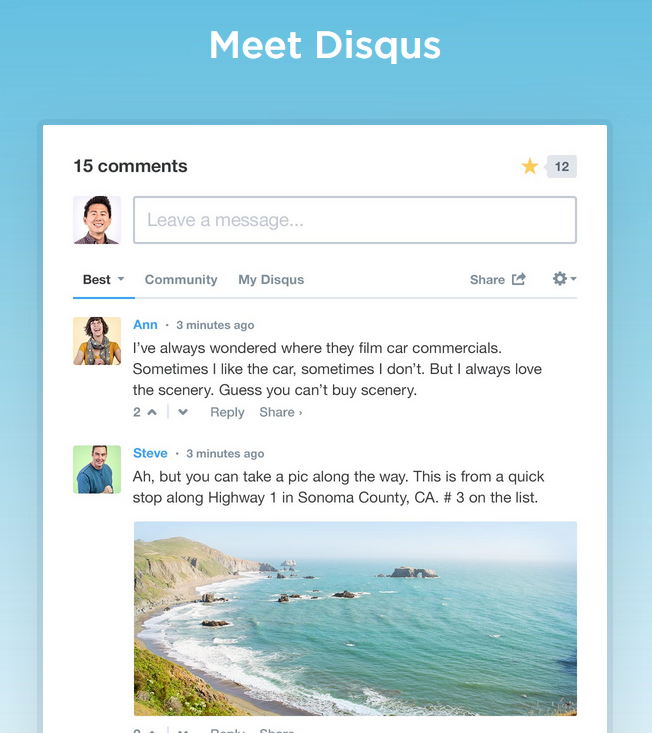
The Disqus plugin in action
Both these solutions have specialized mechanisms of combating comment spam. They also allow users to comment using multiple social accounts. You can choose how to display the comments—latest one first or last, etc.
Users can keep track of all the comments they’ve made on any site using Disqus comments. This gives a unique identity to the user (even if he uses multiple social accounts).
One downside of using this service is that it takes time to load, which inadvertently impacts the load time of the page. However, the core element of the comment form loads quickly so that the rest of the WordPress theme components are able to load. Meanwhile, the comment form’s core component asynchronously loads the remaining elements and displays the comments.
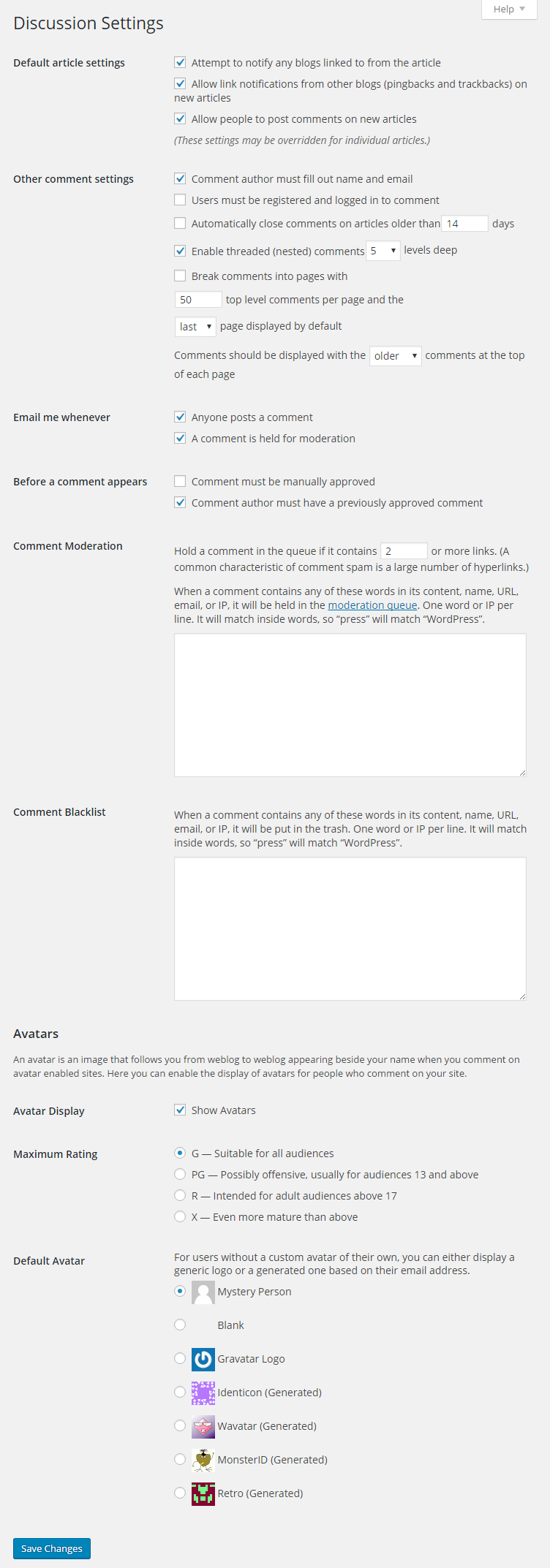
WordPress offers a pretty elaborate set of Discussion Settings.
Let us cover each item under Other comment settings.
- Usually, it is a good idea to force the comment author to fill out his name and email. That way, you can reach him.
- If you plan to build a membership site in the long run (or simply want to collect your reader’s email address), you can force them to register to your site. However, this severely impacts the ease with which the user can leave a comment. However, if you’re that confident about your content, I say go for it!
- You can close the comments feature on old articles. Pages that are old and rank high in multiple search keywords have a lot of spam comments. For example, Copyblogger only allows comments for seven days on any new article published.
- Nested or threaded comments enable visitors to keep track of communication. Using a very high number might end up much cluttered in low-width devices, like smartphone and tablet displays.
- Breaking comments into pages is usually a good idea as it helps maintain structure and context. It is also known to improve your website’s SEO according to WPMU. However, Neil Patel’s sites are full of comments, and he chooses to keep them on one page.
- Finally, this option allows you to sort comments based on submission date.
5. Combat Spam.

One of the most undesirable activities is to combat spam. The moment you start gaining traffic, these unwelcome “call-the-cops” guests flood your WordPress database with meaningless unrelated keywords. Thankfully, we have a full article that talks about combating WordPress spam.
Conclusion
This WordPress comment management guide is simply a collection of practical advice from a couple of places and a few from personal experience. At the risk of sounding repetitive, please ensure that you respond to the people who spend the time and effort to leave a comment on your blog. It’ll do wonders in the long run.
Have an essential tip for the list? Let us know!
[ad_2]
Source link


















